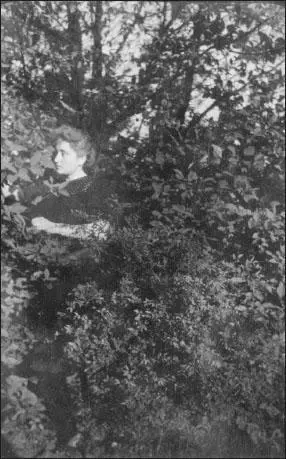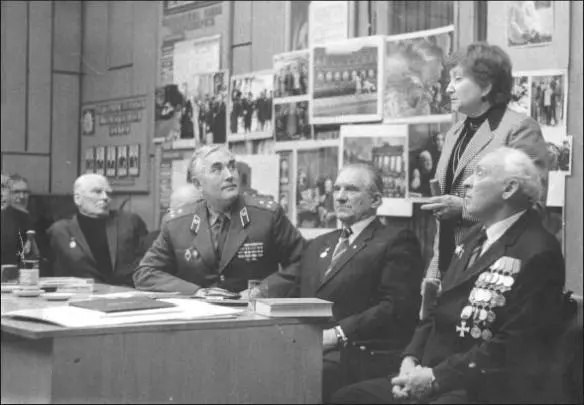By this time my grandmother no longer had the strength to participate in filming and it fell to me to read on her behalf from her books and diaries. Nina Belyaeva managed to find Käthe’s eighty-year old niece. That is how her film ends: I in grandmother’s apartment in Moscow and Käthe’s niece in her own home read in turn from Käthe’s reminiscences of prison, her sentence, the journey to Siberia, the hard labour camp and her return. At one remove, Yelena and Käthe finally met in us and told the story to its end.
The film was shown on French television in spring 2017, and on 25 April Nina Belyaeva sent me a link to download it. [1] The film, The Death of Hitler: The History of a State Secret (in French), can be viewed at https://www.youtube.com/watch?v=XcDCtElYTT4 .
I found it in my mailbox a few hours after my grandmother passed away.

Yelena Rzhevskaya, photographed at GHQ on 29 January 1942.

Yelena Rzhevskaya in 1943.

Theo Auerbach’s German–Russian ‘dictionary of swearing’, published by the Army Faculty of Western Languages, Moscow, 1942.

Rzhevskaya and comrades enjoying a light-hearted moment during the winter of 1943.

The best-known photograph of Yelena Rzhevskaya in uniform, dated 30 May 1943.

Amateur dramatics in the French POW camp near Bydgoszcz, seen in the photo given to Rzhevskaya: ‘The role of the mademoiselle was also being taken by a captive French officer.’ With its inscription: ‘From a French soldier of the African army in captivity to the victorious army.’

Marianna and Alfred in Bydgoszcz. ‘Now… I see how young this thirty-year old teacher from Liége still was.’

‘I did manage to tear myself away from the documents for a short while, and walk round the city in the company of our driver, Sergey, and several officers… the Reichstag, not yet cool after the fire, was still smoking.’


In front of the temporary monument built by the Russians to celebrate the Allied victory, decorated with portraits of Truman, Stalin and Churchill.

Rzhevskaya with a pair of traffic cops, German and Russian, large and small: ‘The girls directing traffic… were… enlivening Berlin’s crossroads.’

8 May 1945. The post-mortem examination of the body of Josef Goebbels. Dr Faust Shkaravsky, principal forensic medicine specialist of the 1st Byelorussian Front, is third from the left.

Dental assistant Käthe Heusermann’s diagram of Hitler’s teeth, crucial to identification of the body. Heusermann and her colleague Echtmann were later harshly treated in Soviet captivity.

Käthe Heusermann and dental technician Fritz Echtmann with two Russian officers.

In the Tiergarten with a German sFH 15 cm gun (left, top); in the government district (far left, below); at the Bismarck memorial in the Tiergarten (left). ‘Wyktoria Buzińska sewed me a green dress from the lining of a coat, and ornamented it with… a piece of polka-dotted satin… Later, in May, I wore this dress when I was photographed in Berlin at… various… historic settings.’

Yelena Rzhevskaya at Finow, where the remains of Hitler and Goebbels were re-examined by Stalin’s special emissary, an unnamed general.

Yelena Rzhevskaya at a 1986 conference in memory of Marshal Georgiy Zhukov. His driver, Alexander Buchin, is on the right.
Elena Kagan was born in Gomel, Belarus in October 1919. She moved with her family to Moscow in 1922 where she later studied philology at Moscow State University. After serving the war effort as a munitions worker and after finishing a war interpreter’s course Elena joined Gen Dmitry Lelyushenko’s army of resistance in 1942. By February 1945 Elena was working in Poznan before joining the USSR’s 3rd Army’s attack on the Reichstag in late April. Her journey to Berlin began in Rzhev on the Volga, where millions of Red Army soldiers died fighting German forces. She adopted the surname Rzhevskaya to honour the fallen.
Rzhevskaya was the first person to read key documents related to the last days of the Reich including the personal papers of Hitler. She lived in Moscow after the war to work as a writer and won prizes for her fiction and journalism. She was the author of two acclaimed history books and six war novels. She died in April 2017.

Memoirs of a Wartime Interpreter
This edition first published in 2018 by
Greenhill Books,
c/o Pen & Sword Books Ltd,
47 Church Street, Barnsley,
S. Yorkshire, S70 2AS
www.greenhillbooks.com
contact@greenhillbooks.com
ISBN: 978-1-78438-281-0
Читать дальше





























